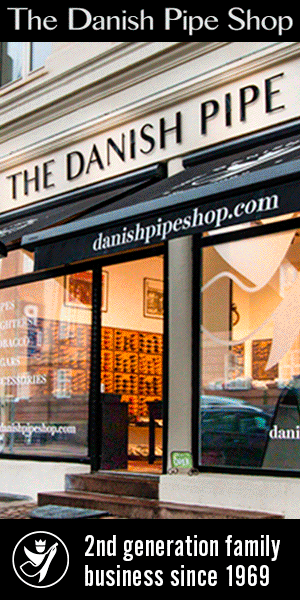
Interesting Completed Ebay Auctions - British Pipes
- Thread starter ssjones
- Start date
You are using an out of date browser. It may not display this or other websites correctly.
You should upgrade or use an alternative browser.
You should upgrade or use an alternative browser.
SmokingPipes.com Updates
Watch for Updates Twice a Week
Well, unfortunately it was not meI had to let this go. Not sure if anyone got it from here? I’d never heard of the tobacconist before, but I thought it was a nice simple set.

ANTIQUE ALLEN & WRIGHT LTD LONDON SMOKING BRIAR PIPE TRAVELLING SET PAIR & CASE | eBay
A beautiful antique travelling twin set of small briar smoking pipes made by Allen & Wright Ltd of London. The wooden parts of the stems are stamped: ALLEN WRIGHT LT. The interior and exterior of the box have the maker's mark stamped in gold.www.ebay.com
Does not look like cheapish pipes at all.
Not bad either, perhaps a little bruised.
For comparison :


Briar Pipe Set Made in 1905 by Allen & Wright recently Imported from London 116 | eBay
Both are surprisingly generous in size for the period (large Dunhill Group 4), cut from Algerian briar, and with hallmarked silver mounts at the shank. In fact, the only other pipe maker (besides Kaywoodie) that used such a tenon design was Barling, of which these are highly reminiscent.
www.ebay.com
Did you bid?
$100 for a Sasieni one dot. Great score for someone.Did you bid?
This is what happens when a seller doesn't make the effort to properly present the item.
Yeah i did. $100 was my limit. Still getting my head around that sniping tactic as in NZ auctions auto extend by 2mins whenever a bid is placedDid you bid?
$100 for a Sasieni one dot. Great score for someone.
This is what happens when a seller doesn't make the effort to properly present the item.
I know, I’m kicking myself for missing this one. Jasienis are fantastically rare. I’ve been looking for one for years to make up a seven day rotation along with my Junhill, Jomoy, Jarling, Joewe, Jaratan and Jen Jade.
Ron, I’ll let you know if I see another in the wildI know, I’m kicking myself for missing this one. Jasienis are fantastically rare. I’ve been looking for one for years to make up a seven day rotation along with my Junhill, Jomoy, Jarling, Joewe, Jaratan and Jen Jade.
This one would have smoked poorly anyway.Yeah i did. $100 was my limit. Still getting my head around that sniping tactic as in NZ auctions auto extend by 2mins whenever a bid is placed
That went for some significant money. Condition is exceptional. Don't recall ever hearing of them, but @jguss would know if anyone would.Well, unfortunately it was not me
Does not look like cheapish pipes at all.
Well I improved my sniping skills…and found they were redundant. The old place a bid and walk away worked this time. pretty chuffed on this 1912 Pete


Vintage PETERSON'S Estate SMOKING PIPE w/ SOLID SILVER Mount & Original Case | eBay
Length: 14.5cm. Weight (g) 61.
www.ebay.com
Nice snag. I don't bother with sniping. It's good for the seller, not so much for the buyer. I know what I'm willing to bid on a pipe and that's what I do and walk away. If someone else wants it more, it's theirs. Duels only benefit the seller.Well I improved my sniping skills…and found they were redundant. The old place a bid and walk away worked this time. pretty chuffed on this 1912 Pete

Vintage PETERSON'S Estate SMOKING PIPE w/ SOLID SILVER Mount & Original Case | eBay
Length: 14.5cm. Weight (g) 61.www.ebay.com
Don't recall ever hearing of them, but @jguss would know if anyone would.
It's a longish story which honestly I don't have time to write up tonight but I'll give one interesting punchline now. By 1885 the firm of Allen & Wright was owned by Robert Cutmore Tucker (1846-1897) and Reginald Allen Fowles (1852-1920). Tucker died without issue and his partner Fowles assumed sole control of the business. Fowles had three sons, but the eldest, Reginald Lawrence Fowles (1879-1917), who was intended as his successor died at Ypres during the Great War; the second, Frank Turner Fowles, (1881-1945) emigrated to South Africa; this left the third, Robert John Fowles (1889-1970) compelled to abandon his intention of a legal career to assume the management of Allen & Wright. Underscoring this decision, forced upon him by his father's death occurring virtually simultaneously with his demobilization from the Honourable Artillery Company, was the need to support his dead brother's wife and three children as well as five children from his father's second marriage. This honorable if undesired duty occupied the bulk of Robert John's working life. His son escaped this fate. The son's name was John Robert Fowles (1926-2005) and he turned his back firmly on a life in trade to become a writer. John Fowles of course went on to become one of the more noted novelists of the 20th century, famous to this day for The French Lieutenant's Woman and many other works.
As for Allen & Wright from what I can tell after a good run of some 75 years it went out of business about 1953; at any rate it is absent from the London telephone directory from 1954 on. Starting out as cigar importers, Tucker and Fowles grew the business to successful enterprise, eventually encompass tobacconist shops, cigarette manufacturing, and pipe making. By the end, perhaps a victim of the economic desolation of post-war Socialist Britain, it had declined to a single shop. As for what Allen & Wright's claim to be a pipe maker really meant it is of course hard to say. Most likely as was common industry practice at the time A&W imported bowls all or mostly finished, added a stem and some bling, and sold them both in their shops and through distribution. This last is speculation but informed by what we know of the briar pipe industry in England a century and more ago.
Last edited:
Jon, one day can you please write a novel combing all the crazy antics of turn of the century pipe life into the story of a single family.
Darn, that is a darn good looking very rare Pete.Well I improved my sniping skills…and found they were redundant. The old place a bid and walk away worked this time. pretty chuffed on this 1912 Pete

Vintage PETERSON'S Estate SMOKING PIPE w/ SOLID SILVER Mount & Original Case | eBay
Length: 14.5cm. Weight (g) 61.www.ebay.com
Congrats !
Unfortunately they do not ship to the Netherlands anymore .
I won some very nice pipes from them for a bargain price.
Their pictures were a lot more "shady" back then and the descriptions were rather crappy.
Methinks something fishy going on here :


1979 Dunhill Bruyere 18K Gold Spigot Large Billiard English Estate Pipe for sale | eBay
Get the best deals for 1979 Dunhill Bruyere 18K Gold Spigot Large Billiard English Estate Pipe at eBay.com. We have a great online selection at the lowest prices with Fast & Free shipping on many items!
www.ebay.com
Pretty strong sale on a Killarney 999 pre-Republic. Can't say I have ever seen a Killarney Natural.


Peterson Natural “John Bull” 999 (Early Republic) | eBay
For information on thisspecific pipe see Peterson Pipe Notes #113. For more on Peterson’s original John Bull chubbies see #114. This Killarney Natural “John Bull” shape 999 can be dated to 1953-1959 and is the real deal as far as Peterson’s Chubby bent rhodesian goes.
www.ebay.com







